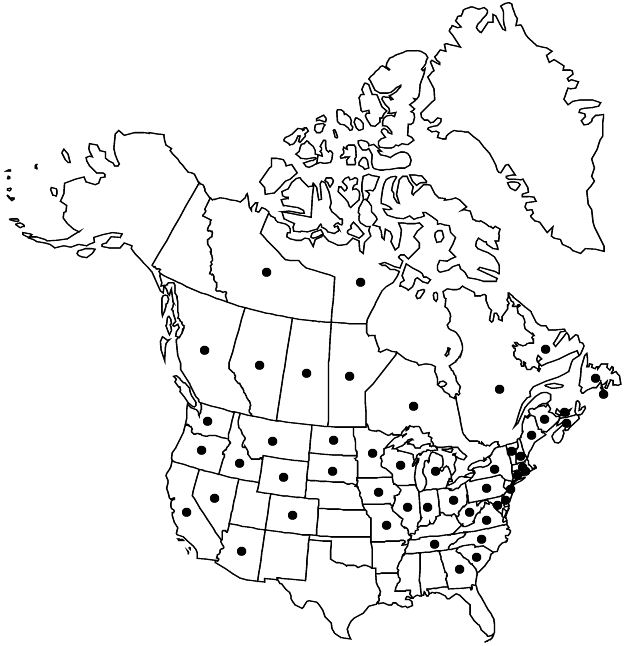Viola macloskeyi
Erythea 3: 74. 1895.
Plants perennial, acaulescent, stoloniferous, 2–10 cm; stolons pale, often rooting and leafy at nodes; rhizome slender, fleshy. Leaves basal, 2–6, ascending to erect; stipules ovate to linear-lanceolate, margins entire or glandular-toothed, apex acute; petiole 1–10 cm, strigose; blade unlobed, reniform to ovate, 1–6.5 × 1–5.5 cm, base broadly or shallowly cordate, margins ± entire or shallowly crenate, eciliate, apex rounded to acute, surfaces usually glabrous, abaxial surfaces sometimes puberulent on proximal 1/2. Peduncles 2.5–11(–21) cm, usually glabrous, sometimes villous. Flowers: sepals lanceolate to ovate, margins eciliate, auricles 0.5–2 mm; petals white on both surfaces, lower 3 purple-veined, lateral 2 bearded, rarely beardless, lowest 6–12 mm, spur white, gibbous, 1–2.5 mm; style head beardless; cleistogamous flowers on ascending peduncles. Capsules ovoid, 5–9 mm, glabrous. Seeds beige to bronze, 1–1.5 mm. 2n = 24.
Phenology: Flowering Mar–Sep.
Habitat: Bogs, wet meadows, seeps, lake margins, stream banks, floodplains, swampy woods, mesic roadside depressions, often among mosses
Elevation: 0–3600 m
Distribution

St. Pierre and Miquelon, Alta., B.C., Man., N.B., Nfld. and Labr., N.W.T., N.S., Nunavut, Ont., P.E.I., Que., Sask., Ariz., Calif., Colo., Conn., Del., Ga., Idaho, Ill., Ind., Iowa, Maine, Md., Mass., Mich., Minn., Mo., Mont., Nev., N.H., N.J., N.Y., N.C., N.Dak., Ohio, Oreg., Pa., R.I., S.C., S.Dak., Tenn., Vt., Va., Wash., W.Va., Wis., Wyo.
Discussion
Viola macloskeyi was described by Banks in 1824 as V. rotundifolia var. pallens, from specimens collected by Banks in Labrador. E. Brainerd made the combination V. pallens in 1905 and later (1924) detailed its troublesome nomenclatural history.
Viola macloskeyi was described in 1895 by F. E. Lloyd based on specimens collected at the base of Mount Hood, Oregon. M. S. Baker (1953) placed V. macloskeyi as a subspecies of V. pallens. He later (1953b) corrected that change based on priority and thus the taxon became known as V. macloskeyi subsp. pallens. N. H. Russell (1955) maintained that status, separating subspp. macloskeyi and pallens on the wider, spreading basal leaf lobes of subsp. pallens. McKinney, after examining specimens of both taxa, including types, concluded that the differences have been exaggerated and fall within the range of variation of a single species.
Viola macloskeyi occurs in small colonies; individual plants are interconnected by stolons.
In parts of its range, Viola macloskeyi often shares habitat with V. renifolia; it may be difficult to distinguish the two. The stolons of V. macloskeyi are useful for identification during summer months; V. renifolia plants lack stolons. Patterns of indument can be useful; V. renifolia is usually hairy and V. macloskeyi is usually glabrous (petioles sometimes pubescent).
Viola macloskeyi reportedly hybridizes with V. primulifolia var. primulifolia (= V. ×mollicula House).
Selected References
None.